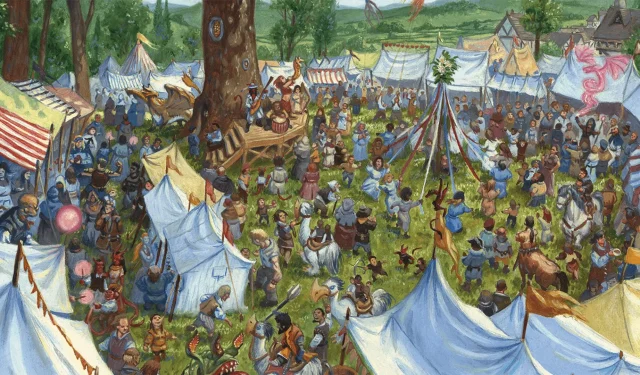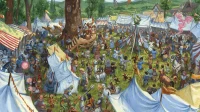An important aspect of Dungeons & Dragons has been left out of the newly released System Reference Document (SRD) 5.2, which restricts third-party developers’ opportunities within the updated framework. Today, Wizards of the Coast launched the SRD under a Creative Commons license, providing a selection of the game’s latest rules for creators to reference and utilize in their own content. This release aims to establish a foundation for external D&D materials, shaping the future offerings designed to enhance gameplay for years to come.
Although the new SRD encompasses several subsystems introduced in the upcoming 2024 Core Rulebooks for D&D and includes guidelines for crafting compatible monsters, one significant subsystem is notably absent. The Bastion system, which equips players with the ability to create personalized home bases that confer mechanical advantages, is missing. This omission prevents creators from developing new home base materials for Dungeons & Dragons, consequently limiting the diversity of upcoming third-party content.
Examining SRD 5.2: Included and Excluded Elements
What’s Inside and What’s Not



The new SRD incorporates all 12 core classes from the Player’s Handbook, featuring one subclass for each. Additionally, many backgrounds and species are included, although notably absent are the aasimar rules, as these remain proprietary to Wizards of the Coast. The document includes various monsters, highlighting classic dragons, yet iconic creatures like mind flayers and beholders do not appear due to similar IP constraints.
Among the new mechanics, the SRD features the weapon mastery system and exploration rules, along with details for both mundane equipment and various magical items. A significant alteration is that items such as the Deck of Many Things and Orb of Dragonkind have been renamed to protect intellectual property. In contrast to earlier SRD versions, many Plane references and well-known creatures like Strahd and Tiamat have been entirely excluded from this public ruleset.
The Absence of Bastions in D&D’s New SRD
Third-Party Support for Base-Building Is Restricted

The most glaring exclusion from SRD 5.2 is the Bastion system, which enables players to design home bases with tangible benefits during gameplay. This system details how to construct a bastion, lists various facilities that can be improved throughout a campaign, and introduces bastion turns, allowing players to manage repairs and facility activations effectively.
For those wishing to explore SRD 5.2 in its entirety, it can be accessed via D&D Beyond.
Bastions are designed to enhance gameplay between campaign arcs, also serving as valuable resources for Dungeon Masters crafting long-term story arcs. Surprisingly, despite its player-focused nature, the Bastion system was not included in the 2024 Player’s Handbook. Instead, Wizards of the Coast designated these rules for the Dungeon Master’s Guide, restricting them to a secondary rulebook.
This decision reflects that only DMs can decide if and when to allow players to utilize the Bastion mechanics, given that players assume a mini-DM role while customizing their bases. Furthermore, Wizards has indicated plans to facilitate support for Bastions in upcoming setting rulebooks, such as the anticipated Eberron: Forge of the Artificer.
The Consequences of Excluding Bastions for D&D
Excluding Bastion Rules May Encourage Competing Systems

Wizards of the Coast’s choice to exclude bastions from the SRD is perplexing, as it prevents third-party creators from developing corresponding content that could enrich the game. This absence implies that new offerings won’t provide additional bastion features or elaborate on existing ones. While Wizards might aim to reserve future updates specifically for their resources, this decision opens the door for alternative systems that could overshadow their established rules.
Given that establishing home bases is a cherished component of many D&D campaigns, Wizards’ refusal to advertise their proprietary Bastion system seems counterproductive. While safeguarding certain material due to IP rights is understandable, there seems to be no rationale for omitting the Bastion rules from the SRD.
The exclusion of Bastions from the SRD equates to fragmented support and competition from alternate rulesets, ultimately undermining the integral mechanics of D&D’s evolving rules. This decision appears to be short-sighted, potentially detrimental to one of the game’s most innovative features.
For further insights, consult the source: D&D Beyond


